Table of Contents
Guide


HARVEST HOUSE PUBLISHERS
EUGENE, OREGON
Unless otherwise indicated, all Scripture quotations are taken from the Holy Bible, New International Version, NIV. Copyright 1973, 1978, 1984, 2011 by Biblica, Inc. Used by permission of Zondervan. All rights reserved worldwide. www.zondervan.com. The NIV and New International Version are trademarks registered in the United States Patent and Trademark Office by Biblica, Inc.
Verses marked ESV are taken from The ESV Bible (The Holy Bible, English Standard Version), copyright 2001 by Crossway, a publishing ministry of Good News Publishers. Used by permission. All rights reserved.
Verses marked NASB are taken from the (NASB) New American Standard Bible, Copyright 1960, 1971, 1977, 1995, 2020 by The Lockman Foundation. Used by permission. All rights reserved. www.lockman.org.
Scripture quotations marked MSG are taken from THE MESSAGE, copyright 1993, 2002, 2018 by Eugene H. Peterson. Used by permission of NavPress, represented by Tyndale House Publishers. All rights reserved.
Scripture quotations marked CSB have been taken from the Christian Standard Bible, Copyright 2017 by Holman Bible Publishers. Used by permission. Christian Standard Bible and CSB are federally registered trademarks of Holman Bible Publishers.
Scripture quotations marked AMP are taken from the Amplified Bible, Copyright 2015 by The Lockman Foundation. Used by permission. www.lockman.org.
James Merritt is represented by the Christopher Ferebee Agency, www.christopherferebee.com
Cover design by Faceout Studio, Lindy Martin
Cover Photo Art Furnace / Shutterstock
Interior design by KUHN Design Group
For bulk, special sales, or ministry purchases, please call 1-800-547-8979.
Email: Customerservice@hhpbooks.com
 This logo is a federally registered trademark of the Hawkins Childrens LLC. Harvest House Publishers, Inc., is the exclusive licensee of this trademark.
This logo is a federally registered trademark of the Hawkins Childrens LLC. Harvest House Publishers, Inc., is the exclusive licensee of this trademark.
How to Deal with How You Feel
Copyright 2022 by James Merritt
Published by Harvest House Publishers
Eugene, Oregon 97408
www.harvesthousepublishers.com
ISBN 978-0-7369-8534-5 (pbk.)
ISBN 978-0-7369-8535-2 (eBook)
Library of Congress Control Number: 2021949963
All rights reserved. No part of this electronic publication may be reproduced, stored in a retrieval system, distributed, or transmitted in any form or by any meanselectronic, mechanical, digital, photocopy, recording, or any otherwithout the prior written permission of the publisher. The authorized purchaser has been granted a nontransferable, nonexclusive, and noncommercial right to access and view this electronic publication, and purchaser agrees to do so only in accordance with the terms of use under which it was purchased or transmitted. Participation in or encouragement of piracy of copyrighted materials in violation of authors and publishers rights is strictly prohibited.
CONTENTS
I recently began seeing a therapist, which I must admit made me feel a little awkward. You see, Ive been a pastor for more than 45 years, so Im usually the one performing the counseling, not the one receiving it. People often come to me for help when theyre feeling sad or mad or guilty. They seek me out when theyre overwhelmed by disappointment or disagreement or disease or death and they cant seem to control all the emotions these experiences have dredged up. As a pastor, my job is to help them process what theyre feeling in a biblical way.
But now Ive ended up on the other side of the desk. Im the one seeking advice, not doling it out, and this is a new experience for me. My counselor, like all good counselors, has helped me deal with my feelingshonestly confront the emotions churning inside of me. Conversations with him have uncovered hidden insecurities, catalogued anxieties, and revealed unspoken jealousies I didnt even know I was harboring. Weve worked to process my angersomething Ive had to deal with all of my lifeand to confront the guilt I sometimes feel.
Maybe you can relate. An early 2021 report by the American Psychological Association revealed that 84 percent of American adults had recently felt anxious (47 percent), sad (44 percent), angry (39 percent), or some other powerful emotion associated with prolonged stress such as experienced in a pandemic.
But you dont need a study to know an emotion commotion is going on in America. The pandemic and Americas other challenges certainly contributed to the results in that report, but for all kinds of reasons, everywhere you look youll witness the burning fires of anger, the sneak attacks of anxiety, the furrowed wrinkles of worry, and the sweat of stress running down foreheads.
And lets not pretend these emotions are only out there and not inside us as well. Perhaps youre a single mom angry with your ex-husbandthe one who left you for another woman and is trying to dodge paying child support. Maybe youre depressed because you lost your dream job when your company downsized and its shredded your sense of self-worth. You might feel anxious because youre awaiting the results of a biopsy, and the worry is compounded by fear youll receive bad news. Or perhaps you feel bitter toward someone you once trusted as a friend who betrayed you and couldnt care less about your hurt.
Feelings are not the most important thing about us, but they are one of the more powerful drivers in our lives. So how should we deal with our emotions? Well, first let me tell you how not to deal with them and then what to do instead.
AVOID EXTREMES WITH YOUR EMOTIONS
Whatever their cause, when it comes to the feelings well address in this bookstress, worry, anxiety, depression, fear, loneliness, jealousy, anger, bitterness, and guiltwhat we might call life takersmany people tend to gravitate toward one of two extremes. In an article adapted from his book Untangled Emotions , Alasdair Groves writes about emotional obsession and how some people adopt an emotions are nothing stance. I express this idea by saying people tend to either ignore their emotions or idolize them. Both paths are extreme and problematic.
Ignoring feelings
Some people strive to, as Groves says, keep a stiff upper lip, a saying derived from the physiological fact that a trembling of the upper lip is often the first visible sign of emotion. So, the thinking goes, one should stiffen their upper lip to hide emotion. These people resist feeling what they consider to be unfeel-able feelings churning inside of them. When an acquaintance, coworker, or neighbor asks, How have you been? many people reflexively respond with Fine or some benign equivalent. But if they told the truth, theyd say, Im mad as a hornet or Im down in the dumps or Im worried to death.
Maybe were afraid of admitting our vulnerabilities, but heres the truth: These emotions are not bad; theyre not a sign of weakness or unhealth. Emotions are good, and some of them are even godly. God created us with a mind to think, yes, but also with a heart to feel. As the late British pastor and author John Stott wrote, We are to be neither such emotional Christians that we never think, nor such intellectual Christians that we never feel. No, God made us human beings, and human beings are by creation both rational and emotional.
Next page
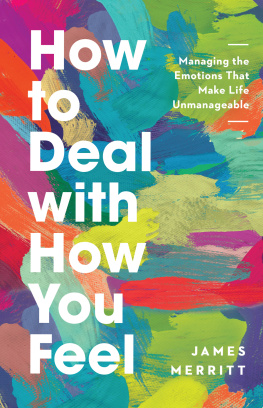
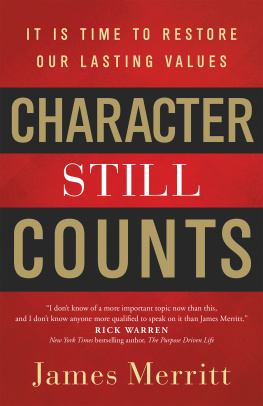
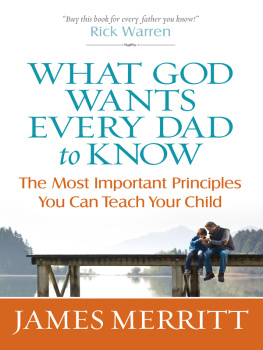
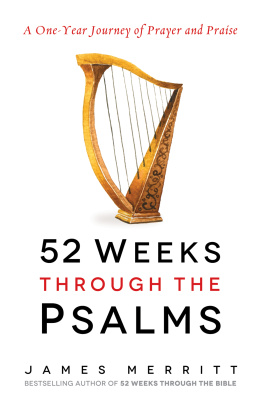
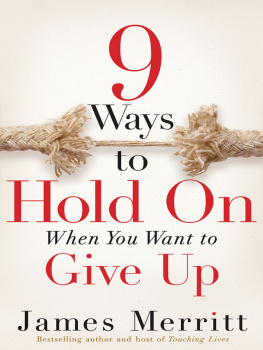
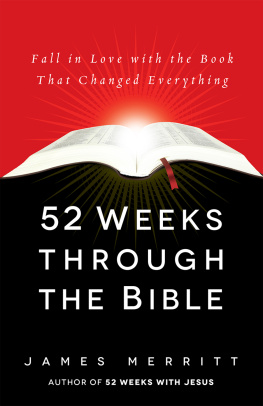
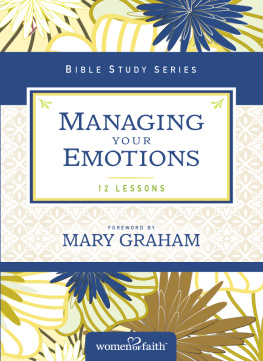
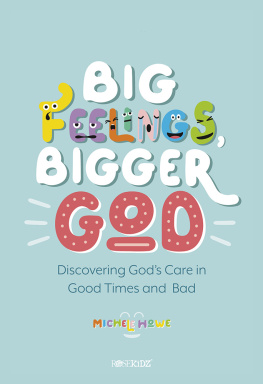
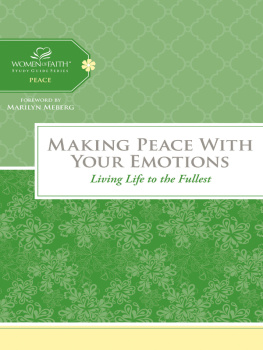
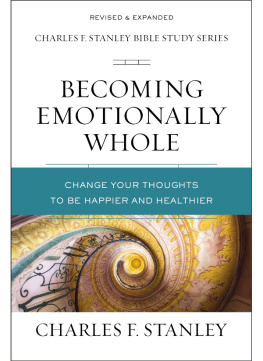
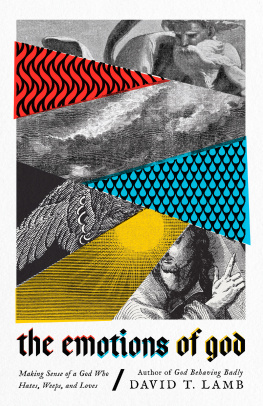
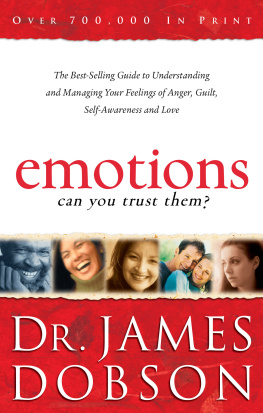
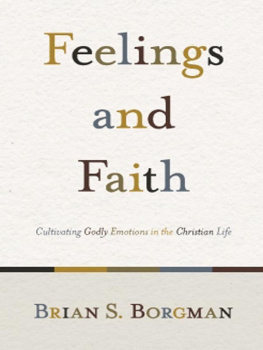
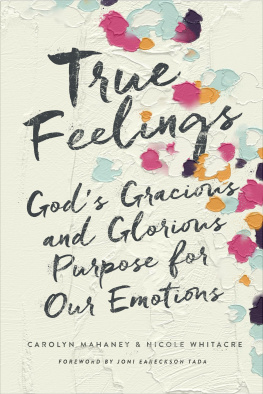
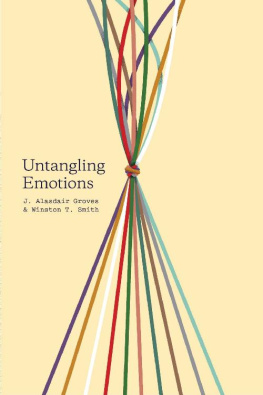



 This logo is a federally registered trademark of the Hawkins Childrens LLC. Harvest House Publishers, Inc., is the exclusive licensee of this trademark.
This logo is a federally registered trademark of the Hawkins Childrens LLC. Harvest House Publishers, Inc., is the exclusive licensee of this trademark.